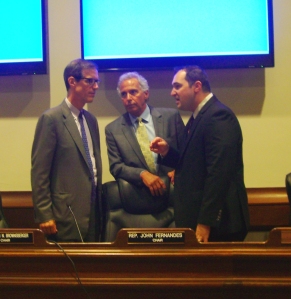(Cross-posted from The COFAR Blog)
The Massachusetts Legislature has rightly drawn criticism for getting little accomplished in the past year, and the following is yet another example of that apparent failure to go ahead and just do the right thing.
The right thing would be to enact H. 1459, a bill that would make it easier for parents of individuals with developmental disabilities to become their guardians. It’s not among the more visible pieces of legislation that lawmakers have had to deal with; yet, it’s potentially important to all family members of developmentally disabled people, and we’ve heard of no reason why it should be controversial.
The bill, which was last filed more than a year ago with the Judiciary Committee, proposes that a spouse or parent be presumed in probate court to be suitable as a guardian of a developmentally disabled or otherwise incapacitated person unless competent evidence is introduced to the contrary.
The bill has the support of major advocacy organizations for the developmentally disabled, including COFAR, and even of the Massachusetts Developmental Disabilities Council, which, while federally funded, is yet technically part of the Baker administration. The MDDC listed H. 1459 as one of its legislative priorities for 2015-2016.
Yet while the Judiciary Committee did hold a public hearing on H. 1459 last June, at which COFAR and other organizations testified in support of the measure, the committee has taken no action on the bill.
State Representative David Linsky has actually repeatedly filed the bill since 1999 at the request of Stan McDonald, a constituent of his, who has been involved in a seemingly endless and infinitely frustrating battle to gain guardianship of his son, Andy.
The bill, however, never gained any traction in the Legislature from 1999 on. This past year appeared to be different, particularly given that the bill was labeled a priority by the MDDC. But now it’s not clear that anything really is different than in those past years.
Earlier this month, both Linsky and Senator Richard Ross, McDonald’s state senator, sent a letter to the co-chairs of the Judiciary Committee, Senator William Brownsberger and Representative John Fernandes, urging their committee to approve the bill and send it to the full House for a vote.
I spoke last week to aides to both Ross and Linsky who said they didn’t know of any reason that the bill has not moved in the committee. An aide to Linsky said Linsky had met “more than once” with Fernandes to urge his support for the bill.
I then spoke last week with the legislative counsel to Senator Brownsberger, who said she too knew of no reason that the bill has not yet come up for a vote in the committee. She said I should talk with Fernandes’ office because the measure is technically a House bill.
So I called Fernandes’ office on Friday and was forwarded to a legislative aide’s voice mail. So far, no one has called me back.
To be fair, the Judiciary Committee has also taken no action on a related bill (H. 1469), which would prohibit state or other authorities from charging a parent or legal guardian with abuse or neglect, based on the type of medical care the parent or guardian has chosen for an individual in their care.
That bill, dubbed “Justina’s Law,” was also filed more than a year ago on behalf of the family of Justina Pelletier. Justina, a teenager, spent nearly a year in a locked ward in Boston Children’s Hospital after doctors there disagreed with the family’s belief that she was suffering from mitochondrial disease.
The outcome so far for these two bills shows how difficult it is to get even uncomplicated and uncontroversial legislation passed by the Massachusetts Legislature, and how much power the chairs of these committees have to stall or block legislation.
Holding a bill for a year in a committee without taking action on it might not seem that long a time, but for the guardianship bill, there has been no action since 1999. Seventeen years is a long time to wait for a man like Stan McDonald, who is now 80 years old, to right the wrongs that have been done to his son and himself.
It’s not that there has ever been any publicly stated opposition to the guardianship bill. As far as we know, no committee has ever actually voted not to approve it. It’s just that no one in power in the Legislature has apparently ever cared enough to do the right thing and enact the bill.
This, in our view, is what is really wrong with the Legislature. It’s not that the leadership specifically won’t pass “progressive” bills; it’s that the leadership can and does block anything that it doesn’t like for whatever reason. And often we never find out what that reason is.
